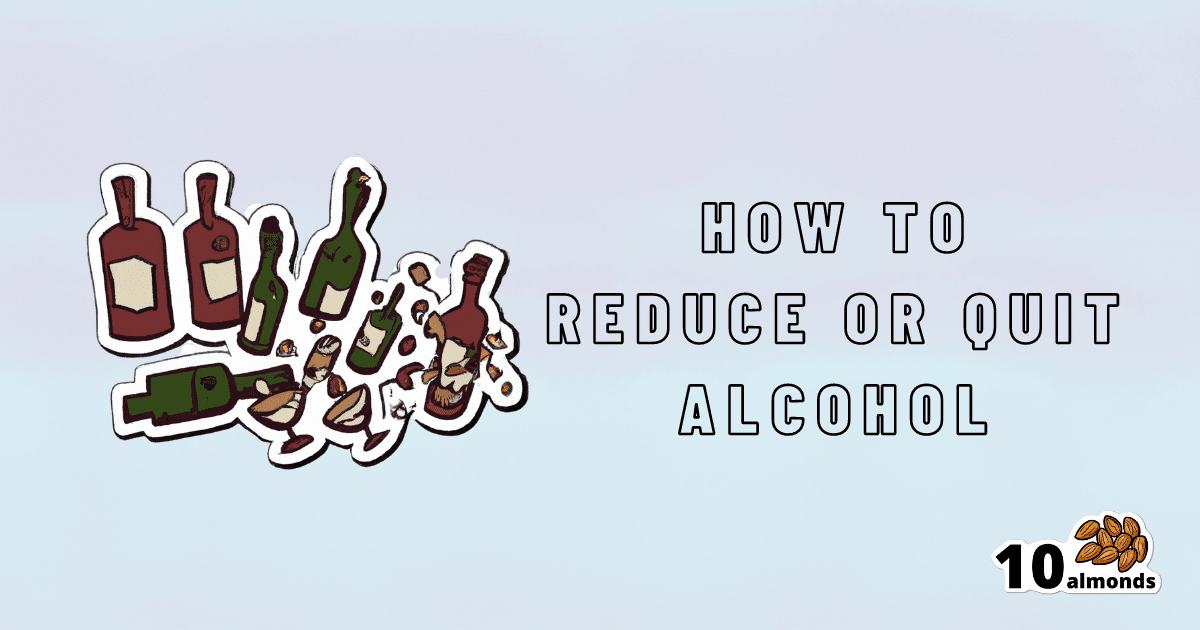How To Reduce Or Quit Alcohol
Rethinking Drinking: Improve your diet, exercise, sleep, and quit smoking. Learn about the harmful effects of alcohol, including skin aging, weight gain, and memory problems. Find alternative drinks and coping strategies.

Rethinking Drinking
When we’re looking at certain health risks, there are often five key lifestyle factors that have a big impact; they are:
- Have a good diet
- Get good exercise
- Get good sleep
- Reduce (or eliminate) alcohol
- Don’t smoke
Today, we’re focussing the alcohol bit. Maybe you’d like to quit, maybe just cut down, maybe the topic just interests you… So, here’s a quick rundown of some things that will help make that a lot easier:
With a big enough “why”, you can overcome any “how”
Research and understand the harm done by drinking, including:
And especially as we get older, memory problems:
Alcohol-related dementia: an update of the evidence
And as for fear of missing out, or perhaps even of no longer being relaxed/fun… Did you ever, while sober, have a very drunk person try to converse with you, and you thought “I wish that were me”?
Probably not 😉
Know your triggers
Why do you drink? If your knee-jerk response is “because I like it”, dig deeper. What events prompt you to have a drink?
- Some will be pure habit born of convention—perhaps with a meal, for example
- Others may be stress-management—after work, perhaps
- Others may be pseudo-medicinal—a nightcap for better* sleep, for instance
*this will not work. Alcohol may make us sleepy but it will then proceed to disrupt that very sleep and make it less restorative
Become mindful
Now that you know why you’d like to drink less (or quit entirely), and you know what triggers you to drink, you can circumvent that a little, by making deals with yourself, for example
- “I can drink alcohol, if and only if I have consumed a large glass of water first” (cuts out being thirsty as a trigger to drink)
- “I can drink alcohol, if and only if I meditate for at least 5 minutes first” (reduces likelihood of stress-drinking)
- “I can drink alcohol, if and only if it is with the largest meal of the day” (minimizes total alcohol consumption)
Note that these things also work around any FOMO, “Fear Of Missing Out”. It’s easier to say “no” when you know you can have it later if you still want it.
Get a good replacement drink
There are a lot of alcohol-free alcohol-like drinks around these days, and many of them are very good. Experiment and see. But!
It doesn’t even have to be that. Sometimes what we need is not even an alcohol-like drink, but rather, drinkable culinary entertainment.
If you like “punch-in-the-face” flavors (as this writer does), maybe strong black coffee is the answer. If you like “crisp and clear refreshment” (again, same), maybe your favorite herbal tea will do it for you. Or maybe for you it’ll be lemon-water. Or homemade ginger ale.
Whatever it is… make it fun, and make it yours!
Bonus item: find replacement coping strategies
This one goes if you’ve been using alcohol to cope with something. Stress, depression, anxiety, whatever it may be for you.
The thing is, it feels like it helps briefly in the moment, but it makes each of those things progressively worse in the long-run, so it’s not sustainable.
Consider instead things like therapy, exercise, and/or a new hobby to get immersed in; whatever works for you!
Share This Post
Learn To Grow
Sign up for weekly gardening tips, product reviews and discounts.




